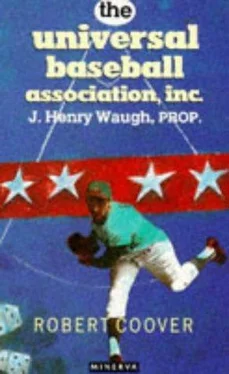He says, git out on the field, we got a im-portant
game!
PLAY BALL! (My head? s a goddamn balloon!)
PL AY BALL! (Go 'way, don't come back soon!)
PL AY BALL! (That's what the umpire said…)
PLAY BALL! (But, boys, I just gotta stay here
in bed!)
Well, I'm stretched out on my cot there like an
old tomcat,
I got such a hangover that I don't know where
I'm at,
I'm dreamin' 'bout that woman when the boss
busts in the door,
Throws water on my head and dumps me out
on the floor!
PLAY BALL! (Oh no! git outa my mind!)
PLAY BALL! (Cantcha see I'm damn near
blind?)
PLAY BALL! (That's what the umpire said…)
PLAYBALL! (Gawdamighty, I wish I was
dead!)
Wisely, Hettie had asked no further questions about the who or wherefrom of Damon Rutherford, though, on parting, she did with a Hettie Irden wink say that if ever that hoy had a new pitch he wanted to try out on an old veteran, he'd find her wanning a stool at Pete's. Warming the bench, Henry had corrected her, then had pointed out she had not yet witnessed sliders, spitballs, screwballs, knucklers, or the turnover fast ball, not to mention the duster, or "purpose pitch." Hoo-eee! she'd whooped at the list, and: Purpose? What purpose?
Bean ball, high and inside, force the batter back, drop him to his knees, the pitch Toothbrush Terrigan was famous for, touch of meanness that could turn a game into a general free-for-all. Oboy, that's for me! she'd cackled, then had sent him off with a whispered: Tonight!
Well, he'd have to see. For the moment, he spread open ledgers before him on his desk to look busy and thought about line-ups for the next round of games. Let's see, the league-leading Knickerbockers had lost yesterday, so that closed the Pioneers up to just two games behind. Too bad he couldn't pitch Damon against the Haymakers again tonight; that'd finish Pappy Rooney off forever. Who then? Had to save the Ace, Mickey Halifax, for the upcoming series with the Knicks, so he'd have to go with one of the Regulars. Drew McDermott maybe. Idly, he summarized sales receipts, one eye on his boss Horace Zifferblatt, who paced in a flushed pout inside his glass cage of an office. Didn't come out, though. Henry didn't know if that was a good sign or a bad one. Probably bad.
One thing was troubling him, and he realized he had to face up to it: Damon Rutherford meant more to him than any player should. It had happened before, and it had always caused problems. For example now: Damon had already pitched over sixty innings, and he had the best earned-run average in the Association. To be classified an Ace the following year, a pitcher had to pitch a minimum of eighty innings, have one of the ten lowest ERA's in the league. It was the same with hitters: the top twenty-four batters of one season were the Stars of the next. These ratings gave them slightly better odds with the dice, gave the game more continuity. There were always a few changes each year, of course, as some of the Stars and Aces fell, usually at least a fourth of them, and newcomers moved up to take their places, but this was perfectly natural and desirable — what in fact made room for guys like Damon Rutherford. All right, here it was, just midseason, still thirty-seven games to go, and they might suddenly start hitting him. The smart thing would be to baby Damon through the remaining fifteen or twenty innings he needed, pitching him against weaker teams, using him in one-inning relief stints in which, according to the rules, he would pitch as an Ace, so as to make sure he made that all-important leap next year, without which no great career was possible. Otherwise, pitching him regularly, the bottom could suddenly fall out. It had before with other bright young Rookies, many times. So why shouldn't Bancroft do it, why shouldn't he baby him? Because Barney Bancroft didn't know what Henry knew. He didn't know about the different charts. He didn't even know about Aces and why it was the good ones often stayed good over the years. Of course, he must have sensed it, they all did: that peculiar extra force that these great players seemed to radiate. Take the Haymakers' Hamilton Craft, for example, now in a miserable slump, and yet Rooney couldn't pull him from the line-up yesterday because he somehow felt that Craft was the best man he had — he was right, but he didn't know exactly why. It was the same when a man fell from class: you could feel it, though sometimes it was hard to believe it, and you kept using the man anyway, waiting for him to bounce back. But what could you feel about Damon Rutherford right now? Only that he might be the greatest pitcher in world history, and how could you bench a man like that? No, Damon had passed up Ace Halifax, was clearly the bellwether of the Pioneer staff, the number-one starter, and unless he showed some signs of losing control that Bancroft could recognize— and even then Barney might rightly prescribe more pitching and not less — then he'd have to pitch at least another ten or twelve games. And could Henry sit idly by and watch the kid get powdered, lose hope of becoming an Ace? He had to. Oh, sure, he was free to throw away the dice, run the game by whim, but then what would be the point of it? Who would Damon Rutherford really be then? Nobody, an empty name, a play actor. Even though he'd set his own rules, his own limits, and though he could change them whenever he wished, nevertheless he and his players were committed to the turns of the mindless and unpredictable — one might even say, irresponsible — dice. That was how it was. He had to accept it, or quit the game altogether.
Someone, he noticed, was bulking by his desk. Henry looked up, expecting the worst, but it was only his friend Lou Engel. Zifferblatt seemed busy at his desk, working his mouth as though chewing a cud. "Henry!" Lou whispered, one eye Ziffward. "Have you been sick or… or something?"
Henry felt an impulsive urge to explain, to tell Lou about the perfect game, but it would have taken too long and Lou probably wouldn't have got it anyway, so he merely said, "No, no! Feel great, Lou! Just great!"
Lou looked unconvinced. "Let's talk after work," he said. Ziff reared his head, and Lou hurried clumsily down the aisle toward his own desk, kicking over a wastebasket along the way. "Oops! awful sorry!" Poor Lou.
At times, it was true, Henry longed not only to talk about his game, but to have somebody to play it with him. Often, especially during the long routine stretches with one team way out in front, or when continuity and pattern dissipated, giving way to mere accident, he felt the loneliness of his game, longed for an equal with whom to reminisce, to judge, to plan. He had invented alternate schemes for playing the game which would allow for two proprietors or more, and had hinted at the game when talking with Lou, but Lou didn't seem to have quite the right feeling for projects like that. He preferred to play chess or collect stamps or listen to classical music. Of course, now there was Hettie, and the other player didn't have to be an equal, after all. No, there was the possibility of some new arrangement based not on two competing and antagonistic equals, but rather on the relinquishment of certain, let us say, feminine powers and duties, the creation of a kind of vice-proprietor, as it were. But Hettie was probably too unconscious. Whatever she did, it would have to be pretty simple.
So I'm out on the field and the sun is mighty hot,
And I'm thinkin' 'bout all the goddamn troubles
I got,
Next thing I know I'm sawin' 'em off at first
Читать дальше












